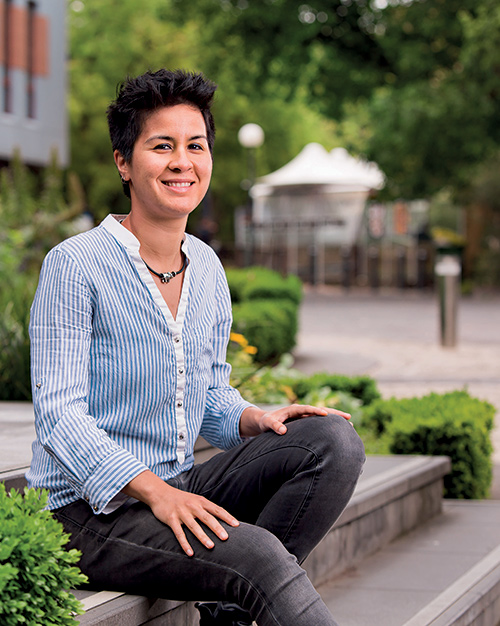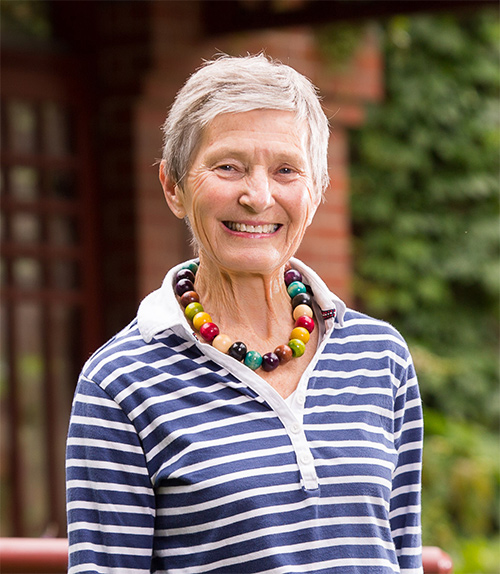
Now, with a Master of Science (Mathematics and Statistics) behind her, Georgia has developed a unique statistical methodology to detect which parts of the human genome might be causally related to rare diseases – an area she is pursuing to PhD.
“I wanted to broaden my mathematical horizons,” she says. “There are lots of people doing fantastic work in statistical genetics here at Melbourne. But it’s a relatively new discipline. We’re rarely able to prove that a gene definitely is – or isn’t – associated with a disease, instead we focus on how much evidence there is in favour of particular sets of genetic variants. I want to figure out whether people with certain genetic variants are more likely to develop certain diseases.”
Georgia received the Helen R Freeman Scholarship, established to encourage women studying in STEM (science, technology, engineering and mathematics). The scholarship meant she could move to Melbourne from New South Wales and support herself while studying. And it means Melbourne is benefiting from a talented young researcher in its ranks.
Alumna and donor Helen Freeman, while not having any scientific background herself, has an enthusiasm for science and interdisciplinary research that motivated her to make a gift through the USA Foundation.

“It is encouraging to see so many women science researchers at the University of Melbourne and its affiliated institutions,” says Helen. Distinguished science graduates include Nobel Laureate Dr Elizabeth Blackburn, molecular biologist Professor Suzanne Cory and geneticist Dr Elena Tucker.
“In reading about the careers of these women, the important influence of parents and classroom teachers who encouraged daughters and girls to think of careers in mathematics and science has often been a factor.
“I chose to support women students studying postgraduate level science and mathematics because their research work may help to improve the lives of others.”
Scholarships and programs that support and encourage women in science from school and university all the way to successful careers is a trend that Helen is very pleased to be involved with. The gift means there are more opportunities available to talented women keen on pursuing careers in a male‑dominated field.
The Helen R Freeman Scholarship is awarded to two students every year. Two recent recipients, Georgia and Dana Piovesan, found a great deal to appreciate in each other’s disciplines.
“Thinking of science as ‘statistics’ or ‘genetics’ is not just boring, but extremely limiting,” says Georgia, who caught up with fellow recipient, biomedical student Dana, during 2016.
“It’s made me appreciate maths a whole lot more than I ever did,” admits Dana, who completed her Master of Sciences (Biomedical and Health Sciences) specialising in immunology. Her research looked at what molecular mechanisms drive a certain white blood cell to become dysfunctional during chronic infections. Dana enlisted the help of a bioinformatician to analyse the genome sequencing data‑sets. “I then had to interpret the results in its biological context. I never really considered how important maths is, and how increasingly important it is becoming, particularly in the field of biology.”
Says Georgia: “It was interesting that both Dana and I were employing mathematical methods to study a genetic problem.
“Especially since our formal training was focused on quite different things. I think it highlights how interdisciplinary scientific work is becoming.”
And what about the emphasis on increasing the participation of women in science? Is it still a problem?
Many women are studying in fields of biology, but I think the top levels are still dominated by males. Helen’s support through the scholarship is very inspiring. It gives women like me the encouragement and motivation to take up opportunities that present themselves and achieve great things.
The Freeman Scholarship remains vitally important in other areas of STEM, particularly the male‑dominated world of mathematics. “There’s still a noticeable gender imbalance in the maths and stats communities,” says Georgia. “But I’m hopeful that with the help and support of programs like Helen’s, that imbalance will also fade.”